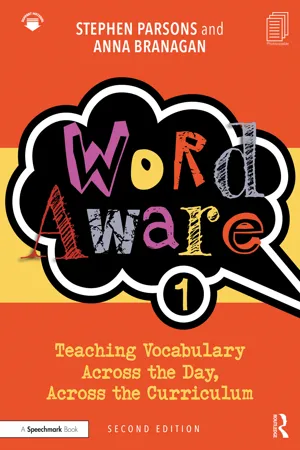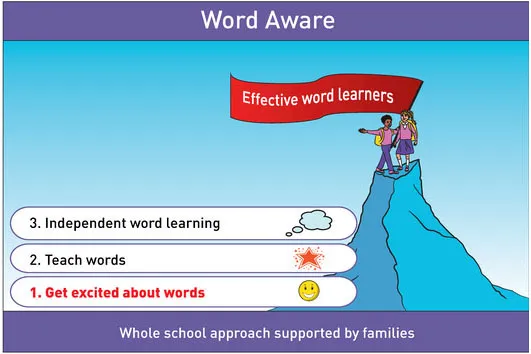
Word Aware 1
Teaching Vocabulary Across the Day, Across the Curriculum
Stephen Parsons, Anna Branagan
- 332 Seiten
- English
- ePUB (handyfreundlich)
- Über iOS und Android verfügbar
Word Aware 1
Teaching Vocabulary Across the Day, Across the Curriculum
Stephen Parsons, Anna Branagan
Über dieses Buch
Now in a fully updated second edition, this comprehensive and practical book outlines the theoretical underpinnings for vocabulary and acts as a 'how to' guide to developing word learning across the school and curriculum. It is packed with easy-to-implement activities, worksheets and resources that can be put into practice immediately with individual students or groups, whole classes and throughout the school.
The Word Aware approach provides a structured framework to promote vocabulary development in all children and has been rigorously tried and tested. Now in full colour, with photocopiable and downloadable materials, it is an outstanding resource that will be an essential addition to any school and classroom.
The second edition of Word Aware 1 brings:
-
- An even wider range of ready-to-go vocabulary activities
-
- Fine-tuned teaching techniques
-
- Enhanced resources to develop children's independent word learning skills
-
- A step-by-step guide to developing a whole school approach
Word Aware 1 is an invaluable tool for teachers and other professionals looking to support children as they broaden their vocabulary. It is particularly suited to children aged 5–11 years but can easily be adapted for older children.
Häufig gestellte Fragen
Information
Step 1:
Get Excited About Words
Get Excited About Words

- Celebrate words: activities and actions which promote enjoyment of the spoken and written word
- Play word games: fun activities that encourage word play, which promotes enjoyment of words, but also allows for new connections to be made. Word learning without knowing about it!

Celebrate words
- Choose a couple of whole school activities from the examples provided on page 34. You could start with ‘whose favourite word?’ (children match a word to a teacher, page 34), children writing their favourite word in chalk in the playground (page 35) or maybe a word challenge day (page 37).
- Every class chooses a couple of class-based activities from the examples on page 89. Each class can do something different. It should be something that is easy to do that really captures your class’s imagination. You could start with the ‘Word Collector’ bookmarks (page 92), create definition mobiles (page 117) or add gems to ‘sparkling’ vocabulary (page 99).
Play word games
- Choose four or so games that are new to you. Most of the games in this book are quick and require little preparation. Write them down somewhere to remind you. Teach them to any staff members who work with you in your classroom.
- Choose the best time to play games. This could be a game slot once a week, a quick game before you get down to work in the morning or to be used when concentration is waning. Establish the habit of playing games regularly.